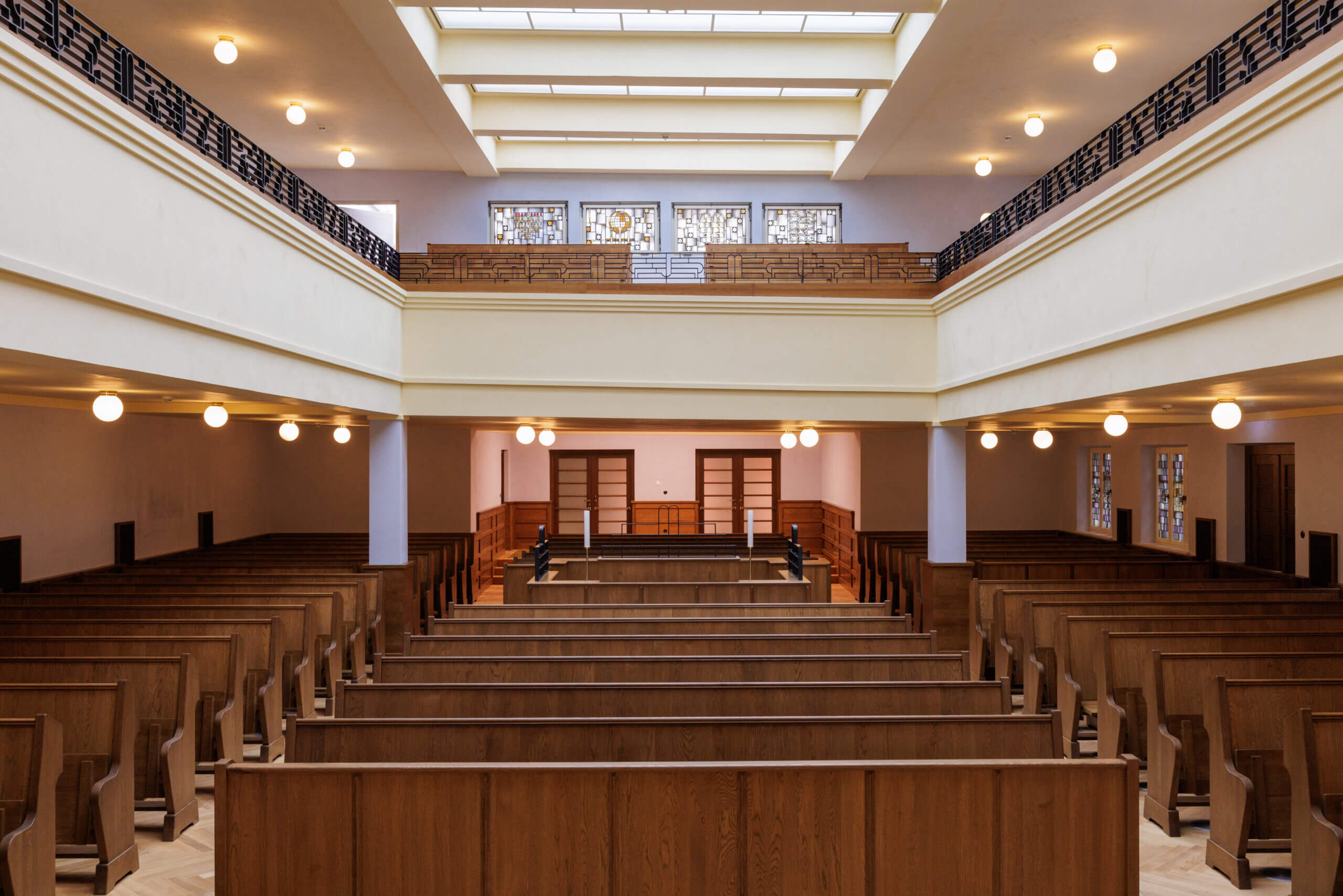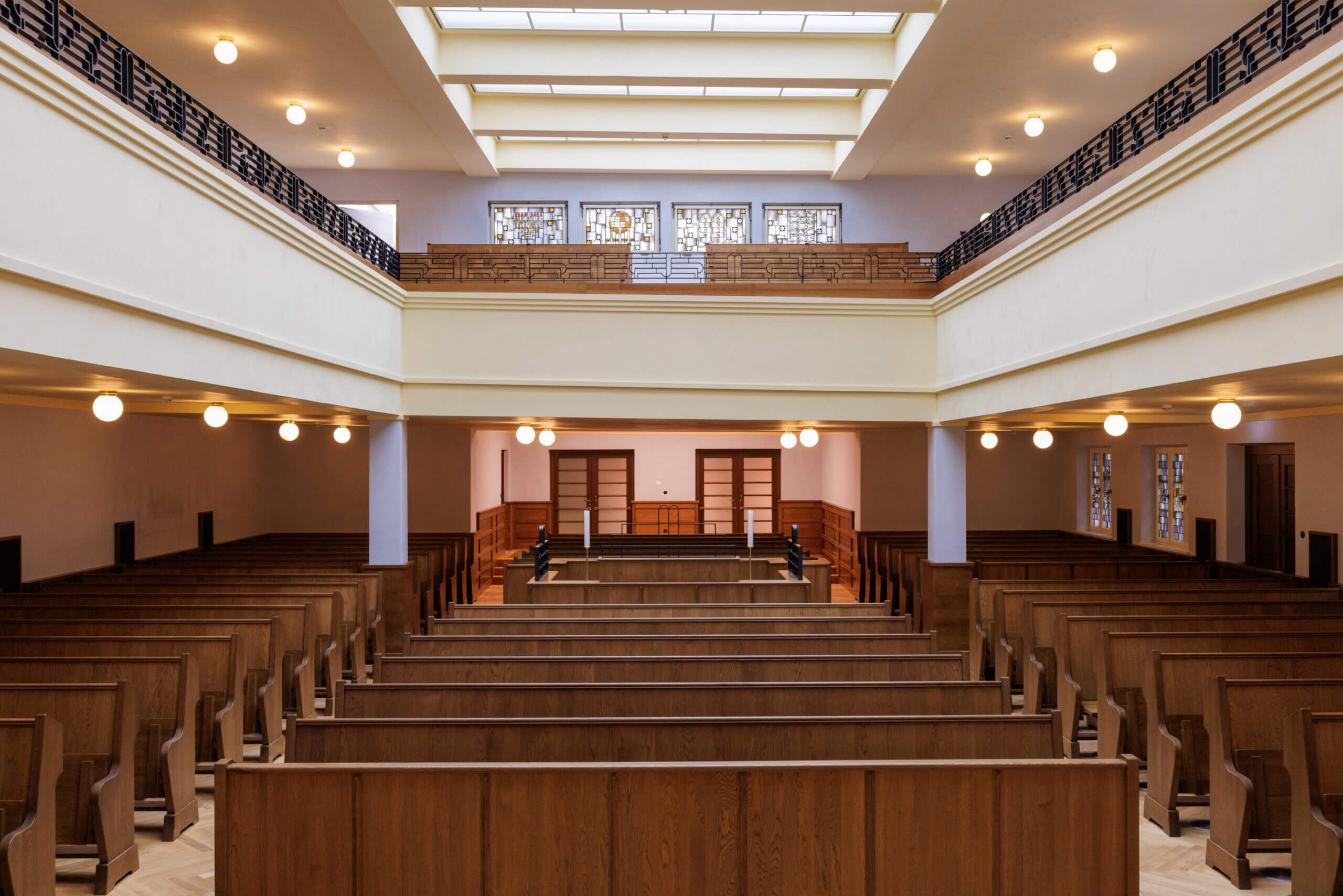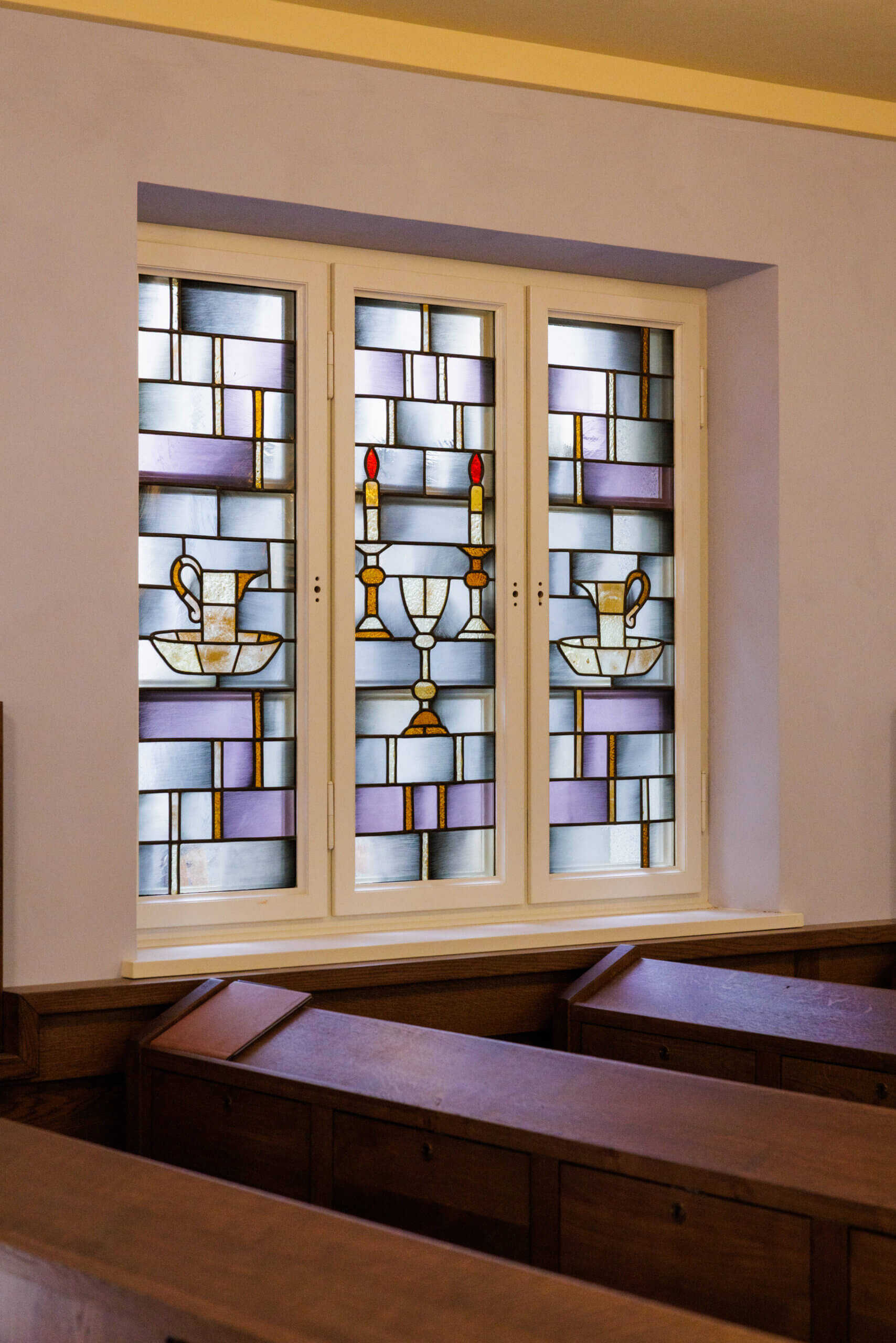Uncategorized
Germany excels at restoring synagogues destroyed by the Nazis. But can they foster new Jewish life?

I was in the pews when Munich reopened the Reichenbachstrasse Synagogue—the city’s only surviving prewar synagogue—last month. It is an exquisite restoration and a bevy of politicians showed up. Germany’s Chancellor, Friedrich Merz, fighting back tears, promised to protect Jewish life; so did Bavaria’s Minister-President Markus Söder and Munich’s mayor Dieter Reiter. The celebrated pianist Igor Levit, who is Jewish, played Mendelssohn and Schubert and wiped away a tear of his own.
It was unmistakably a state occasion. The speeches were solemn, the security heavy and the messaging familiar: “Never again.” “We owe you this.” “Jewish life belongs here.“
Projects like saving the Reichenbachstrasse Synagogue politically legible: they are blueprints, permits, ribbon-cuttings and, a price tag you can print in a press release. They are also finite. What isn’t finite is the work of actually keeping Jewish life alive inside the walls the state has paid to refurbish.
The cost of renovating Jewish life in Germany is not cheap. The €14 million (roughly $16.5 million) project was paid for by the German government, the state of Bavaria and the city of Munich, with the non-profit association that led the rescue effort covering the remainder. It is admirable that so many actors came together to make this restoration possible. Yet recent history provides a few cautionary tales.
Particularly since the 1980s, numerous synagogues have been polished, though not necessarily brought back to life, with public funds. In Erfurt, Essen, Görlitz and Augsburg, architectural restoration has often stood in for restoring Jewish life.

Perhaps the strangest and most glaring example of this is Berlin’s Neue Synagoge, whose Moorish façade dazzles and gold dome glistens since 1995. However, the massive sanctuary—once the largest in Europe—was never rebuilt. Berlin’s Rykestrasse Synagogue, lovingly restored between 2004-2007 is a notable exception; it is currently Germany’s largest functioning Jewish house of worship, but its small community is dwarfed by the enormity of its interior.
Unlike a city like Görlitz (which has roughly 30 Jews), it makes good sense to foster new synagogues in Munich and Berlin, the cities with the highest Jewish populations in Germany, according to the Central Council of Jews in Germany. With sufficient support (including, naturally, engagement from Munich’s Jewish Community, which owns the building), the new Reichenbachstrasse Synagogue could become a revitalized spiritual home for Munich Jewry.
Designed by the Bauhaus-trained architect Gustav Meyerstein, the 550-seat Reichenbachstrasse Synagogue originally opened in Munich on Sept. 5, 1931. It was vandalized in the Kristallnacht pogrom of November 1938, patched up by survivors, and reopened in 1947 as Munich’s main synagogue—until the community moved in 2006 to Sankt Jakobs Platz, a nearby central square.
Its renovation is full of beautiful, resonant choices that display a painstaking attention to detail. The curtain for the ark that will house the Torah scrolls is woven from original fabrics by the Bauhaus textile master Gunta Stölzl—a gift from her grandson, Ariel Aloni, who flew in from New York to make the donation. The new stained-glass windows were fabricated by the Munich glassworks firm van Treeck, the same company that was contracted for the original windows back in 1931, according to Meyerstein’s designs.

Yet amid the talking points of German responsibility to safeguarding Jewish life, there was no credible plan presented for the building’s future.
Plenty of rabbis were present, yet none spoke. No prayers were recited. The evening was billed as a reopening, not a rededication of an active Jewish religious space. Rachel Salamander, a renowned German-Jewish literary scholar who spearheaded the shul’s rescue, made a point of saying that the Reichenbachstrasse Synagogue had been “restored as a house of worship—that is its primary purpose: to be a house of God.” But concrete details on when or how that might happen were not forthcoming.
When I asked around at the reception (where the food was provided by a non-kosher caterer), nobody could tell me who will be davening here regularly, what the prayer schedule is, or how the community intends to avoid turning this restored synagogue into yet another monument to Jewish life before the Holocaust.
A synagogue is not a “kulturelles Hotspot” (as Munich’s mayor bizarrely said he’d wished it would become) and Jewish life is not a series of German politicians wearing polyester-velvet kippot for the cameras. A flourishing shul is the outcome of operating budgets, clergy contracts and volunteer rosters. Jewish life means a space for prayer, study and conversation, and rabbis and scholars to facilitate it.
None of this is as telegenic as a chancellor’s tears. All of it costs money—the unglamorous kind that never ends. It is also bureaucratically irksome, and, in a country where antisemitic incidents nearly doubled in 2024, according to data compiled by the Federal Research and Information Point for Antisemitism, not without its challenges.
If the politicians who spoke so eloquently last month mean what they say about safeguarding Jewish life, they cannot stop at new pews, stained-glass and Bauhaus textiles. If “never again” is to be more than a rhetorical flourish, it has to be cashed out in regular prayer, in teaching, in the messy conviviality of a real congregation.
I have a selfish stake in all this: I live in the neighborhood. Sitting in the renewed sanctuary exactly a week before Rosh Hashanah, I imagined praying there; I imagined the awkward, happy collisions that define a living shul—the bar-mitzvah kiddush where the rugelach and schnaps runs out, the evenings when congregants in their holiday best cross paths with revelers in lederhosen and dirndls. (As Salamander pointed out, the Jewish High Holidays often coincide with Oktoberfest, as happened this year.)
If the Reichenbachstrasse Synagogue becomes a house of prayer again—regularly, reliably—then Merz’s tears will have meant something. If it doesn’t, then we have mounted yet another memorial to Jews where a shul ought to be.
The post Germany excels at restoring synagogues destroyed by the Nazis. But can they foster new Jewish life? appeared first on The Forward.
Uncategorized
Jewish hockey star Jack Hughes’ overtime goal propels US to historic gold medal in Olympic hockey
(JTA) — Jewish hockey star Jack Hughes scored the game-winning goal Sunday to clinch a gold medal for the U.S. men’s hockey team, its first since 1980.
The New Jersey Devils star center, who had scored twice in Team USA’s semifinal win, sent the puck between the legs of Canadian goaltender Jordan Binnington 1:41 into overtime to give the American team a 2-1 win.
“This is all about our country right now. I love the USA,” Hughes told NBC. “I love my teammates.”
The win broke a 46-year Olympic drought for Team USA, which had not taken gold since the famous “Miracle on Ice” team that upset the Soviet Union on its way to gold in 1980. The United States also won in 1960.
“He’s a freaking gamer,” Quinn Hughes, Jack’s older brother and U.S. teammate said, according to The Athletic. “He’s always been a gamer. Just mentally tough, been through a lot, loves the game. American hero.”
Quinn Hughes is a defender for the Minnesota Wild and a former captain of the Vancouver Canucks who won the NHL’s top defenseman award in 2024. He was also named the best defender in the Olympic tournament by the International Ice Hockey Federation after scoring an overtime goal to send the U.S. team to the semifinals.
The third Jewish member of the U.S. team, Boston Bruins goaltender Jeremy Swayman, won the one game he played, a Feb. 14 preliminary-round victory over Denmark.
The Hughes family — rounded out by youngest brother Luke, who also plays for the Devils — has long been lauded as a Jewish hockey dynasty. They are the first American family to have three siblings picked in the first round of the NHL draft, and Jack was the first Jewish player to go No. 1 overall. They are also the first trio of Jewish brothers to play in the same NHL game and the first brothers to earn cover honors for EA Sports’ popular hockey video game.
Jack, who had a bar mitzvah, has said his family celebrated Passover when he was growing up. Their mother, Ellen Weinberg-Hughes, who is Jewish, represented the U.S. women’s hockey team at the 1992 Women’s World Championships and was on the coaching staff of the gold-medal-winning women’s team in Milan. Weinberg-Hughes is also a member of the International Jewish Sports Hall of Fame.
Hughes’ golden goal ushered in a burst of Jewish pride on social media, with one user calling it “the greatest Jewish sports moment of all time.” The Hockey News tweeted that Hughes was “the first player in hockey history to have a Bar Mitzvah and a Golden Goal! Pretty cool!”
Jewish groups and leaders also jumped on the praise train. “Special shout out to @jhugh86 on scoring the game-winning goal!” tweeted Jonathan Greenblatt, CEO of the Anti-Defamation League. “Beyond his incredible skill on the ice, Jack makes history as a proud representative of the American Jewish community, reminding us that the Jewish people are interwoven into America in her 250th year! Mazel Tov, Jack!”
The post Jewish hockey star Jack Hughes’ overtime goal propels US to historic gold medal in Olympic hockey appeared first on The Forward.
Uncategorized
Iran and US Views on Sanctions Relief Differ, Iranian Official Tells Reuters

Iranian women walk past an anti-US billboard in Tehran, Iran, February 19, 2026. Photo: Majid Asgaripour/WANA (West Asia News Agency) via REUTERS
Iran and the United States have differing views over sanctions relief in talks to curb Tehran’s nuclear ambitions, a senior Iranian official told Reuters on Sunday, adding that new talks were planned in early March as fears of a military confrontation grow.
Iran and the US renewed negotiations earlier this month to tackle their decades-long dispute over Tehran’s nuclear program as the US builds up its military capability in the Middle East, fueling fears of a wider war.
Iran has threatened to strike US bases in the Middle East if it is attacked by US forces.
“The last round of talks showed that US ideas regarding the scope and mechanism of sanctions relief differ from Iran’s demands. Both sides need to reach a logical timetable for lifting sanctions,” the official said.
“This roadmap must be reasonable and based on mutual interests.”
Iran’s Foreign Minister Abbas Araqchi said on Friday that he expected to have a draft counterproposal ready within days, while US President Donald Trump said he was considering limited military strikes.
READINESS TO COMPROMISE
While rejecting a US demand for “zero enrichment” – a major sticking point in past negotiations – Tehran has signaled its readiness to compromise on its nuclear work.
Washington views enrichment inside Iran as a potential pathway to nuclear weapons. Iran denies seeking nuclear weapons and wants its right to enrich uranium to be recognized.
Washington has also demanded that Iran relinquish its stockpile of highly enriched uranium (HEU). The UN nuclear agency last year estimated that stockpile at more than 440 kg of uranium enriched to up to 60% fissile purity, a small step away from the 90% that is considered weapons grade.
The Iranian official said Tehran could seriously consider a combination of exporting part of its HEU stockpile, diluting the purity of its most highly enriched uranium and the establishment of a regional enrichment consortium in exchange for the recognition of Iran’s right to “peaceful nuclear enrichment.”
“The negotiations continue and the possibility of reaching an interim agreement exists,” he said.
BENEFITS FOR BOTH SIDES
Iranian authorities have said that a diplomatic solution delivers economic benefits for both Tehran and Washington.
“Within the economic package under negotiation, the United States has also been offered opportunities for serious investment and tangible economic interests in Iran’s oil industry,” the official said.
However, he said Tehran will not hand over control of its oil and mineral resources.
“Ultimately, the US can be an economic partner for Iran, nothing more. American companies can always participate as contractors in Iran’s oil and gas fields.”
Uncategorized
Mike Huckabee’s Comments to Tucker Carlson on Israel and Middle East Land Draw Condemnation in Region

Tucker Carlson speaks on first day of AmericaFest 2025 at the Phoenix Convention Center in Phoenix, Arizona, Dec. 18, 2025. Photo: Charles-McClintock Wilson/ZUMA Press Wire via Reuters Connect
Comments by US Ambassador to Israel Mike Huckabee suggesting that Israel had a biblical right to much of the Middle East drew condemnation over the weekend from countries across the region, who called his remarks “dangerous and inflammatory.”
Huckabee, an evangelical Christian, has been a staunch supporter of Israel throughout his political career and a longtime defender of Jewish settlements in the West Bank – land which the Palestinians seek for a state.
In an interview with Tucker Carlson that was conducted on Wednesday in Israel and aired on Friday, the populist US talk show host asked Huckabee about Israel’s right to exist and about Jewish roots in the ancient land.
Citing the book of Genesis, Carlson asked whether the modern state of Israel had a right to the lands promised in the Bible by God to Abraham, stretching from the Euphrates River to the Nile, covering much of the Middle East. In response, Huckabee said:
“It would be fine if they took it all. But I don’t think that’s what we’re talking about here today.”
Huckabee added: “We’re talking about this land that the state of Israel now lives in and wants to have peace in, they’re not trying to take over Jordan, they’re not trying to take over Syria, they’re not trying to take over Iraq or anywhere else. They want to protect their people.”
In response, a joint statement condemning Huckabee’s comments was issued by the Palestinians and countries in the Middle East and beyond, including Jordan, the United Arab Emirates, Saudi Arabia, Egypt, Turkey, Indonesia and Pakistan.
They said his comments were: “Dangerous and inflammatory remarks, which constitute a flagrant violation of the principles of international law and the Charter of the United Nations, and pose a grave threat to the security and stability of the region.”
A US Embassy spokesperson said Huckabee’s comments did not reflect any change in US policy and that his full remarks made clear that Israel has no desire to change its current boundaries.
Israeli officials did not immediately comment on the interview or the reaction from countries that signed the joint statement.


